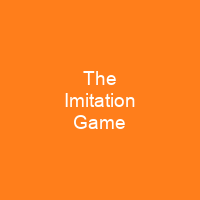The Imitation Game is a 2014 historical drama film directed by Morten Tyldum and written by Graham Moore. It is based on the 1983 biography Alan Turing: The Enigma by Andrew Hodges. The movie stars Benedict Cumberbatch as British cryptanalyst Alan Turing. Keira Knightley, Matthew Goode, Rory Kinnear, Charles Dance, and Mark Strong co-star as well.
About The Imitation Game in brief

The movie is set at Bletchley Park, where Turing worked during the Second World War. The team are trying to analyze the Enigma machine, which the Nazis use to send coded messages. Turing is difficult to work with, and considers his colleagues inferior; he works alone to design a machine to decipher Enigma messages. After overhearing a conversation with a female clerk about messages she receives, Turing has an epiphany, realising he can program the machine to decode words he already knows exist in certain messages. In 1951, two policemen, Nock and Staehl, investigate the mathematician Alan Turing after an apparent break-in at his home. During his interrogation by Nock, Turing tells of his time working at B letchley park. Turing writes to Prime Minister Winston Churchill, who puts Turing in charge of the team and funds the machine. After he recalibrates the machine, it quickly decodes a message and the cryptographers celebrate. Turing realises they cannot act on every decoded message or the Germans will realise Enigma has been broken. After Clarke plans to leave on the wishes of her parents, Turing proposes marriage, which she accepts. When the Soviets are revealed to be the source of the messages, Turing reveals that he is a homosexual. Turing then tells Clarke to leave, revealing that he never cared for her and only used her for her cryptography skills.
You want to know more about The Imitation Game?
This page is based on the article The Imitation Game published in Wikipedia (as of Jan. 04, 2021) and was automatically summarized using artificial intelligence.







